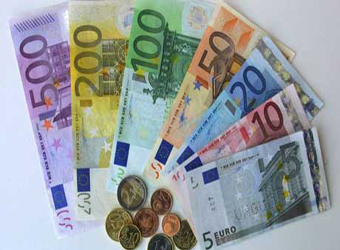euro nursed losses in Asian trading on Wednesday, pressured by political woes in Europe ahead of elections that checked its recent ascent against dollar.
France’s presidential race sank deeper into the mire of scandal after centrist Emmanuel Macron was forced to deny an extramarital affair and conservative Francois Fillon pressed on with efforts to salvage his reputation after accusations that he used taxpayers’ money to pay his wife for work she may not have done.
Uncertainty about the two rounds of the election in April 23 and May 7 drove the premium that investors demand for holding French over German government debt to its highest for almost four years.
Opinion polls show Macron slightly ahead of Fillon in the first round, but behind far-right National Front leader Marine Le Pen.
She has vowed to pull France out of the euro zone and hold a vote on its membership in the European Union.
The euro was slightly lower on the day against the dollar at $1.0681, after falling as low as $1.0656 on Tuesday, its lowest since late January and well below last week’s nearly two-month high of $1.0829.
Against the yen, the euro slipped 0.2 percent to 119.86, after dipping to 119.545 overnight, its lowest since 5 December.
Three-month euro risk reversal spreads on euro/dollar options widened to their largest levels in favor of euro puts- the right to sell the euro- since June 2016.
Adding to the mood of uncertainty, elections will also be held in the Netherlands, Germany and possibly Italy, and Greece faces a bailout review as talks between it, its European lenders and the International Monetary Fund on the country’s bailout obligations have dragged on for months.
However, the dollar’s gains are seen limited by the protectionist stance of U.S. President Donald Trump.
Last week, Trump and a top adviser strongly criticized Japan, China and Germany, claiming they had all devalued their currencies to benefit their own countries.
“The uncertainty of the French presidential election is negative for the euro,” said Masafumi Yamamoto, chief FX strategist at Mizuho Securities in Tokyo.
“But on the other hand, Trump’s dollar policy is supporting euro-dollar. So with these two factors, I don’t see a strong sense of direction at the moment,” Yamamoto added.
The market shrugged off data showing Japan’s current account surplus stood at 1.11 trillion yen ($9.88 billion) in December, below economists’ median forecast for a surplus of 1.29 trillion yen in a Reuters poll.
The dollar was underpinned by news that China’s foreign exchange reserves unexpectedly fell below the $3 trillion level last month for the first time in nearly six years, even as Beijing has tried to curb outflows by tightening capital controls.
The yuan lost more than 6 percent against the dollar last year, the most among major Asian currencies, even as Chinese banks fought to defend it, depleting China’s foreign currency reserves.
It is likely to come under more pressure as the U.S. Federal Reserve resumes hiking interest rates later this year.
The dollar erased early modest gains against the yen and slipped 0.2 percent to 112.23 yen.
But it remained above its overnight low of 111.59 yen, its deepest nadir since late November, as investors awaited a meeting of U.S-Japan leaders.
Trump will welcome Japanese Prime Minister Shinzo Abe on a U.S. visit later this week.
Market participants await any remarks on currencies or on Japan’s fiscal or monetary policies that might emerge from their meeting, although trade and defense issues are likely to be in the spotlight.
“They will probably try to explain about the trade relationship, so I don’t think any surprises will come out, but it’s still difficult to expect what Trump might say,” said Harumi Taguchi, principal economist at IHS Markit in Tokyo.
“If Trump wants the U.S. to sell more cars in Japan, then currencies might come up in the discussion,” she said.
Source: Reuters
